
The House of Torlonia is the name of an Italian princely family from Rome, which acquired a huge fortune in the 18th and 19th centuries through administering the finances of the Vatican. The first influential member of the Torlonia family was Marino Torlonia, who rose from humble origins in the Auvergne region of France to become a very rich businessman and banker in Rome.
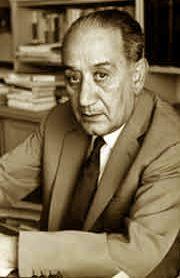
Secondino Tranquilli, best known by the pseudonym Ignazio Silone, was an Italian politician, novelist, essayist, playwright, and short-story writer, world-famous during World War II for his powerful anti-fascist novels. Considered among the most well-known and read Italian intellectuals in Europe and in the world, his most famous novel, Fontamara, became emblematic for its denunciation of the condition of poverty, injustice, and social oppression of the lower classes, has been translated into numerous languages. From 1946 to 1963, he was nominated for the Nobel Prize in Literature.
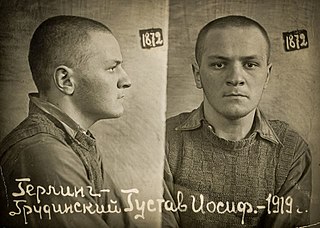
Gustaw Herling-Grudziński was a Polish writer, journalist, essayist, World War II underground fighter, and political dissident abroad during the communist system in Poland. He is best known for writing a personal account of life in the Soviet Gulag entitled A World Apart, first published in 1951 in London.
William Fense Weaver was an English language translator of modern Italian literature.
Dario Biocca is a professor of European history at John Cabot University. He also teaches at the University of Perugia, Italy and has been Coordinatore at Scuola di giornalismo Radiotelevisivo (Perugia). He has a Ph.D. from the University of California, Berkeley and has taught at various institutions in the US and Italy.
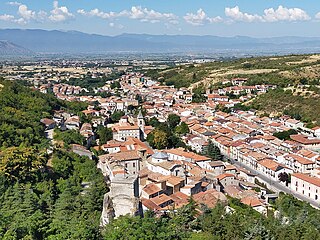
Pescina is a township and comune in the province of L'Aquila, Abruzzo, central Italy. It is a part of the mountain community Valle del Giovenco.
The Unitary Socialist Party was a social-democratic political party in Italy that existed from 1949 to 1951. The party was founded by moderate members of the Italian Socialist Party, who had unsuccessfully tried to stop the collaboration of their former party with the Italian Communist Party (PCI), and some leftist members of the Italian Socialist Workers' Party, who sought a rupture with Christian Democracy (DC) and NATO. The party was led by a former interior minister Giuseppe Romita.
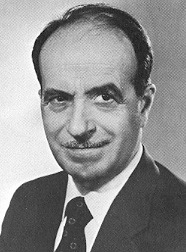
Luigi Preti was an Italian politician and member of the Italian Democratic Socialist Party.
Il Lavoratore was the organ of the Austrian Socialist party and a pacifist paper with ties to Austria through links between Italian and Austrian Socialist parties, out in Trieste. In 1921 it became the organ of the Communist Party of Italy in Trieste. One of its first editors was Cesare Seassaro from Pavia, who died in Fiume on 15 November 1921, where he came to give "organisational support" from the Communist Party of Italy in building the Communist Party of Fiume. After Seassaro Ignazio Silone became the editor of Il Lavoratore in 1922.

Bread and Wine is an anti-fascist and anti-Stalinist novel written by Ignazio Silone. It was finished while the author was in exile from Benito Mussolini's Italy. It was first published in 1936 in a German language edition in Switzerland as Brot und Wein, and in an English translation in London later the same year. An Italian version, Pane e vino, did not appear until 1937.

Fontamara is a 1933 novel by the Italian author Ignazio Silone, written when he was a refugee from Fascist Italy in Switzerland. It is Silone's first novel and it is regarded as his most famous work. It received worldwide acclaim and sold more than a million and a half copies in twenty-seven languages. It was first published in German translation in Switzerland in 1933; English translation was published by Penguin Books in September 1934. In 1980, it was adapted by Carlo Lizzani into an eponimous film.

Fontamara is a 1980 Italian film, directed by Carlo Lizzani based on the novel of the same name by Ignazio Silone. It stars Michele Placido in the role of Berardo Viola and Antonella Murgia as Elvira. Ida Di Benedetto won the Nastro d'Argento for Best supporting Actress in 1981 for her supporting role as Maria Rosa.
Victor Wolfson was an American dramatist, director, writer, producer, and actor.
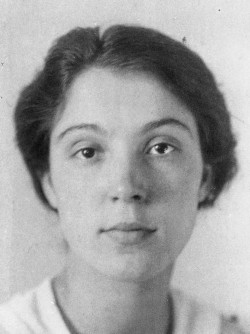
Aline Valangin was a Swiss writer, pianist, and psychoanalyst. She was follower of Carl Jung and became a psychoanalyst.
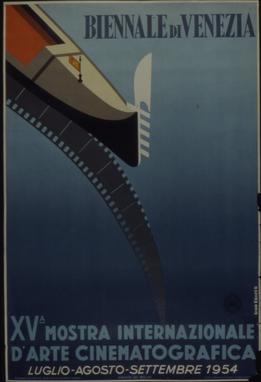
The 15th Venice International Film Festival was held from 22 August to 7 September 1954.
Eric Mosbacher was an English journalist and translator from Italian, French, German, and Spanish. He translated work by Ignazio Silone and Sigmund Freud.
Mauro Canali is a full professor of contemporary history at the University of Camerino in Italy. He is considered to be one of the most important scholars of the events leading to the crisis of the liberal Italian state and the rise of fascism. He has also researched and published extensively on the totalitarian structure of Mussolini's regime, its repressive mechanisms and its system of informants. He studied under Renzo De Felice, and has published in the Journal of Modern Italian Studies, the Italian dailies la Repubblica and Cronache di Liberal.
Frances Frenaye (1908-1996) was an American translator of French and Italian literature. She translated work by writers including Giovanni Guareschi, Balzac, Carlo Levi, Ignazio Silone, and Elie Wiesel.

Luce d’Eramo was an Italian writer and literary critic. She is best known for her autobiographical novel Deviazione, which recounts her experiences in Germany during World War II. D’Eramo's writings are characterized by interest toward controversial subjects and a search of solutions that would liberate people from physical and mental constraints.
Elisabeth Darina Laracy Silone was an Irish journalist, translator, and anti-fascist. She was the wife of the writer Ignazio Silone from 1944 until his death in 1978.










